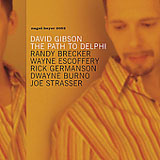Home » Jazz Articles » Album Review » David Gibson: The Path to Delphi
David Gibson: The Path to Delphi
Such is the case with trombonist David Gibson's second release on Nagel Heyer, The Path to Delphi. Possessed of a gorgeously warm tone and confident dexterity reminiscent of J.J. Johnson, Kai Winding, and Curtis Fuller, Gibson writes from a modal-based post bop aesthetic. His compositions don't necessarily stand out; it's unlikely that they'll ever become often-covered classics. But the nine original pieces that make up The Path to Delphi are nevertheless nicely swinging vehicles that give Gibson and his sextet plenty of opportunity to stretch out and explore a mainstream vibe that holds one's attention from start to finish.
With an ensemble that includes three other relative newcomers (saxophonist Wayne Escoffery, pianist Rick Germanson, and drummer Joe Strasser) and two more seasoned veterans (bassist Dwayne Burno and trumpeter Randy Brecker), Gibson has fashioned a group that navigates with authority and complete commitment, despite the relative greenness of some of its members. Escoffery has two of his own releases out on Nagel Heyer, including last year's shimmering Intuition, and his own exploration of a post-Coltrane sensibility is in perfect sync with Gibson's own disposition. Little needs to be said about Brecker, who's nothing if not a team player. His breadth of field and depth of vision enhances every session he's on, yet his almost legendary status never overshadows the younger players.
The three horn lineup—trombone, trumpet, and soprano saxophone (Escoffery sticks solely to the high horn for this set)—makes for a rich and full-bodied front line. Whether on the gently balladic "Hestia's Egress, the lightly swinging "Persephone, the more brooding "Serpents of Hera, or the Spanish-tinged "Icarian Sea, the group echoes a '60s Blue Note vibe, perhaps not as cerebral as saxophonist Wayne Shorter's work, but with some precedence there nonetheless.
Neither forward-thinking enough to rattle any cages nor so backward-looking as to be labelled strictly traditionalist, Gibson's The Path to Delphi is, quite simply, a consistently enjoyable set of well-written tunes, well-played by artists ranging from the established to the emergent. It's too early to tell whether or not Gibson will develop his voice in a more distinctive fashion, but until then he could do far worse than release honest, unassuming, and thoroughly compelling albums like this one.
Track Listing
The Path to Delphi; Icarian Sea; Son of Alcumus; Eidolon; Hestia's Egress; Persephone; Serpents of Hera; The Oracle Within; Prometheus; Peace.
Personnel
David Gibson
tromboneDavid Gibson: trombone; Randy Brecker: trumpet, flugelhorn; Wayne Escoffery: soprano saxophone; Rick Germanson: piano; Dwayne Burno: bass; Joe Strasser: drums.
Album information
Title: The Path to Delphi | Year Released: 2005 | Record Label: Nagel Heyer Records
Comments
Tags
For the Love of Jazz
 All About Jazz has been a pillar of jazz since 1995, championing it as an art form and, more importantly, supporting the musicians who create it. Our enduring commitment has made "AAJ" one of the most culturally important websites of its kind, read by hundreds of thousands of fans, musicians and industry figures every month.
All About Jazz has been a pillar of jazz since 1995, championing it as an art form and, more importantly, supporting the musicians who create it. Our enduring commitment has made "AAJ" one of the most culturally important websites of its kind, read by hundreds of thousands of fans, musicians and industry figures every month.




















